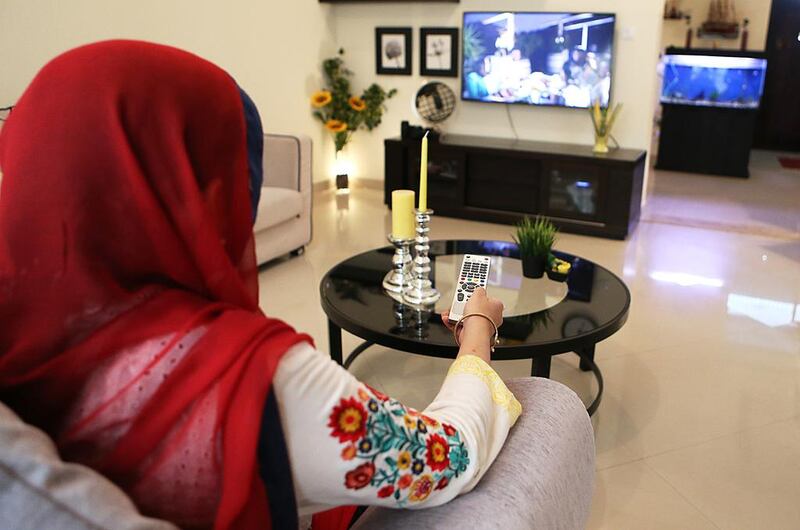ABU DHABI // Once her husband goes to work and daughter leaves for school, housewife Rabia Ali spends most her day sitting in front of the television.
She watches her favourite soap operas, cooking programmes and reality shows.
When her family gets home in the evening, her daughter watches cartoons, while her husband is glued to sports and news channels.
“Being home alone, I pass my time by watching TV. As long as I am not neglecting my family it is worth it,” said Ms Ali, a 29-year-old Pakistani.
But according to recent research, the Ali family is not alone in being addicted to TV. A study by TNS Global in June found the UAE has one of the highest percentage of television viewers in the world, with 86 per cent of people watching TV at least once a day.
This compares with 80 per cent in the UK and 75 per cent in the USA.
According to the study, the percentage of viewers varies depending on their nationality, gender and home emirate.
In the UAE, more than 89 per cent of women watch TV regularly, compared with 84 per cent of men.
The percentage increases with age – 93 per cent of UAE residents between 45 and 65 watch TV.
Abu Dhabi has the highest number of viewers, with 91 per cent. Sharjah comes second with 86 per cent while 81 per cent of Dubai residents watch TV on a regular basis.
Arab expatriates are the most devoted viewers, with about 94 per cent, followed by Emiratis with 91 per cent, then Asian and western expats with 81 per cent.
Media experts say while TV viewing figures are still proportionately high, people are increasingly turning to the internet for their entertainment.
“Online media has made significant inroads into the daily lives of people,” said Steve Hamilton-Clark, chief executive of TNS Mena.
“The amount of time spent on online media is more than double the time spent on traditional media. However, media consumption habit changes during various parts of the day make targeted messaging possible for marketers.”
David Butorac, chief executive for Dubai pay-TV provider OSN, said he did not view online media as a threat to television viewing.
“Online content is a strong complement to the TV experience, and is preferred by people to catch up on their news, entertainment or sports updates on the go. If you look at investments being made by traditional broadcasters in premium television content, they have never been greater,” he said.
He said OSN research on its viewers also showed that women watched significantly more television than men.
Manoj Mathew, content director of Indian television broadcaster Zee TV Middle East, said that entertainment channels were most popular in the UAE.
“The top most popular content is general entertainment with its mixed bag of serials, dramas, talk shows, reality and format shows. The next popular genre is movies and sports followed by news, music and children’s content,” he said.
Rima Sabban, a sociology lecturer at Sheikh Zayed University in Dubai, said these figures were not surprising.
“In a working society, TV is the easiest option available for people to relax at home,” she said.
“Dramas and soap operas that mainly deal with emotional and romantic issues hit the women’s hearts and minds immediately. I have seen women who leave important work and do not leave the couch before the episode ends.”
She said she knew of households where the television was on for almost every waking hour.
But she warned that watching too much TV could have a detrimental effect on one’s mental health.
“It makes one’s mind passive and gives intellectual and emotional fatigue,” she said.
akhaishgi@thenational.ae






